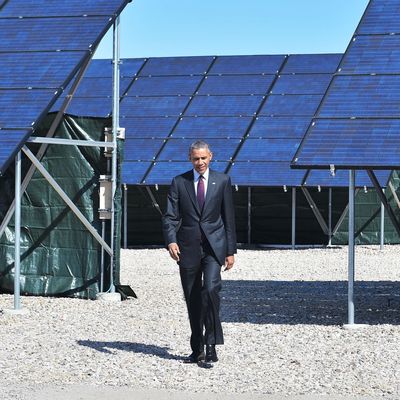
History will probably record the green-energy revolution as the Obama administration’s most important accomplishment. The daisy chain of events began with $90 billion in green-energy subsidies in the stimulus; continued through a wide array of greenhouse-gas-reducing regulations of transportation, construction, and electric power; and culminated with international agreements with China and then the entire world. There are two potential threats to this legacy. The first is a federal lawsuit to block President Obama’s Clean Power Plan, which will lock in and extend emissions reductions in the power sector. Without the plan, the United States would have difficulty meeting its emissions-reduction targets, a failure that could well kick the slats out beneath the Paris climate agreement.
But now that plan is almost certain to survive. The reasons for this are slightly byzantine. The legal challenge will be heard by the D.C. Circuit, a powerful federal court. Judge Nina Pillard, a Democratic appointee, has previously recused herself from a decision about whether the entire court would hear the case, throwing her participation into doubt. But the court announced today she would join the full ruling. Pillard would mean that five six Democratic appointees would sit on the ten-member panel. While judges do not always vote on party lines, Democratic appointees generally do not support activist conservative causes like overturning environmental regulations.
If every Republican judge on the D.C. Circuit votes to strike down the Clean Power plan and somehow persuade one Democratic appointee to join them, the case would go to the Supreme Court. But that court is also split 4-4, and a tie would mean the plan survives.
It is strange how little attention Obama’s climate agenda receives given its global importance. The drama has played out in bureaucratic regulations, court rulings, and international negotiations — not the legislative fights that draw passionate floor speeches in Congress or angry town-hall meetings. Yet, here we are, in a world where zero-emission energy is plunging in cost, solar energy is cheaper than coal or natural gas in much of the developing world — far cheaper, in some places — and a wide array of green-energy technologies are advancing at a furious pace.
Meanwhile, the Republican view of energy policy remains locked in the past. The party refuses to acknowledge the findings of climate science and treats the restoration of the primacy of fossil fuels as its central energy goal. All of which underscores the one remaining threat to Obama’s green-energy revolution: Trump might win.
Update: This post originally undercounted the Democratic appointees on the D.C. Circuit by one. The Court’s Democratic majority makes it even less likely the Plan will be struck down.






























